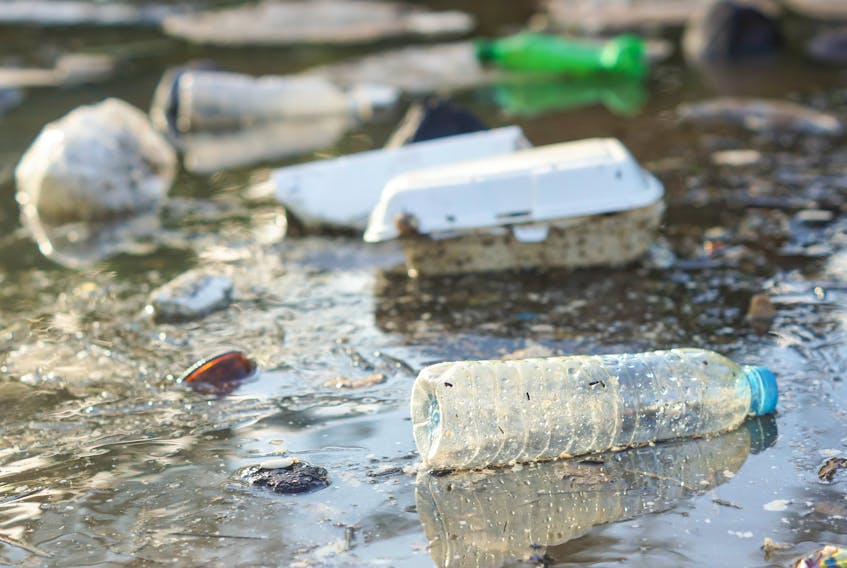“I’ll tell you what scares me is plastic.” — Helen Mirren
By the 1970s, Mr. Ern Warren’s store — where I once stocked shelves after school for pocket change — was an anachronism. Perhaps not in outport Newfoundland, but certainly by the standards of urban parts of the country.

It had deep wooden covered bins for loose dried beans and peas, a big roll of brown butcher paper on an upright stand on the counter (with built-in bottle opener), and a constantly whirring spool of twine. With an efficient snap, Mr. Warren could break off precisely the amount of string he needed to tie up neatly wrapped pork chops or bologna or a block of orange cheddar carved from a giant waxed wheel.
It was a marvelous, wondrous place. There were great high shelves like a library, and he would expertly knock down boxes of cereal and crackers with a yardstick and catch them, tallying up your order with a stub of pencil on a scrap of paper. At Christmastime, he would wrap the small gifts I bought in brown paper bags and stow them in the bins among the peas and beans until I was ready to take them home — knowing a child could have few hiding places in a full house.
Groceries were carted home in cardboard boxes that once held Chiquita bananas or Eversweet Margarine.
There was precious little plastic until Tupperware parties came along. In fact, if the odd commercial plastic bread bag ever crossed Mom’s path, it was so prized that it would get washed and hung out to dry and reused for as long as it lasted. No one talked of recycling; it was just sensible to make do with the materials at hand.
Ironically, plastic was created as a boon to the planet, not a blight. You can blame billiards.
Now, plastic is ubiquitous, with scientists issuing dire warnings about the damage it is doing to landscapes and oceans, harming wildlife and being ingested and passed through the food chain, to the point that The Guardian reported in February: “Scientists warn plastic pollution is now so widespread it risks permanent contamination of the natural world.”
Ironically, plastic was created as a boon to the planet, not a blight.
You can blame billiards.
A Science History Institute article, “The History and Future of Plastics,” explains that, in the 19th century, a growing passion for playing pool put tremendous pressure on the ivory supply, to the point that a New York company offered $10,000 to anyone who could produce a reasonable, simulated facsimile. In 1869, John Wesley Hyatt answered the call and created a synthetic polymer.
“Nature only supplied so much wood, metal, stone, bone, tusk, and horn…,” the article says. “Plastics could protect the natural world from the destructive forces of human need.”
Fast forward 150 years and plastic is being decried for its destructive indestructability. The Guardian reports that the bigger U.K. stores alone “create more than 800,000 tonnes of plastic packaging waste every year.”
So, what can be done?
In England, an organization called A Plastic Planet has one goal: “to dramatically reduce the use of conventional plastic; especially that used to package our food and drink.”
As co-founder Sian Sutherland so astutely put it to The Guardian, “There is absolutely no logic in wrapping something as fleeting as food in something as indestructible as plastic. Plastic food and drink packaging remains useful for a matter of days yet remains a destructive presence on the Earth for centuries afterwards.”
A Plastic Planet worked with Dutch supermarket chain Ekoplaza to open a plastic-free aisle in an Amsterdam store in February — said to be the first of its kind in the world — featuring 700 products packaged in compostable biomaterials that will completely disappear in 12 weeks.
It’s proof that there are harmless, workable alternatives to plastic, but it takes an awareness of plastic pollution, the encouragement of manufacturers to create new materials and the willingness of stores to adopt new philosophies and adapt to the demands of environmentally conscious consumers.
A Plastic Planet is leading the way. The rest of us should follow.
Pam Frampton is a columnist whose work is published in The Western Star and The Telegram. She is The Telegram’s associate managing editor. Email [email protected]. Twitter: pam_frampton









